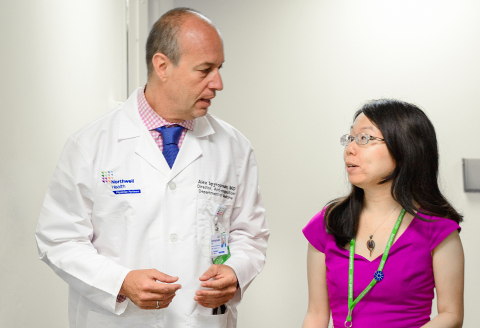Researchers at the Feinstein Institutes for Medical Research are developing new tools to better assess and identify patients at risk for venous thromboembolism (VTE), a condition in which a blood clot forms – most often in the deep veins of the leg, groin or arm.
This press release features multimedia. View the full release here: https://www.businesswire.com/news/home/20200316005543/en/

Dr. Alex Spyropoulos with a colleague (Credit: Northwell Health)
Two research studies led by Alex C. Spyropoulos, MD, Feinstein Institutes professor, analyzed VTE risk in the outpatient cancer population and acutely ill medical patients.
“VTE is a serious and potentially fatal condition that can be caused by surgery, hospitalization for an acute medical illness, cancer and other conditions. Clinicians must identify patients at risk better and earlier,” said Dr. Spyropoulos, who is the director of Anticoagulation and Clinical Thrombosis Services at Northwell Health. “Our research helps assess current VTE predictive tools to improve their effectiveness and ultimately prevent VTE.”
The first study, published February 4th in The Oncologist, sought to validate the most recent risk assessment model (RAM) for the prediction of VTE in the outpatient cancer population – COMPASS-CAT.
Predicting the risk of VTE in outpatients with solid tumors remains difficult, and current models behaved poorly in assessing risk for patients in many of the most common cancers. The study showed that COMPASS-CAT had excellent negative predictive value, but further validation studies in thromboprophylaxis using the model should be conducted with patients within six months of their cancer diagnosis and before the risk assessment model is implemented in routine clinical practice.
The second study, published March 13 in TH Open, evaluated the identification of medically ill patients at high risk for VTE and the benefits of extended thromboprophylaxis (ET) treatment by which blood clots are prevented using an anticoagulant. The identification of patients at high VTE risk remains an important unmet medical need. In recent studies largely spearheaded by Dr. Spyropoulos, the direct oral anticoagulant rivaroxaban is one of the few blood thinners that has recently obtained FDA approval as a treatment.
In this research, Dr. Spyropoulos and his team validated a modified version of a VTE risk tool they had previously developed, called the International Medical Prevention Registry on Venous Thromboembolism (IMPROVE). Results show that using IMPROVE with specific cut-offs in hospitalized medically ill patients while also factoring in the presence of the biomarker D-dimer, a small protein fragment present in the blood after a blood clot is degraded, may help better define VTE risk populations.
“As an established leader in venous thromboembolism, Dr. Spyropoulos’ research continues to advance the diagnostic criteria and appropriate therapy for this serious condition,” said Kevin J. Tracey, MD, president and CEO of the Feinstein Institutes.
About the Feinstein Institutes
The Feinstein Institutes for Medical Research is the research arm of Northwell Health, the largest health care provider and private employer in New York State. Home to 50 research labs, 2,500 clinical research studies and 5,000 researchers and staff, the Feinstein Institutes raises the standard of medical innovation through its five institutes of behavioral science, bioelectronic medicine, cancer, health innovations and outcomes, and molecular medicine. We make breakthroughs in genetics, oncology, brain research, mental health, autoimmunity, and are the global scientific leader in bioelectronic medicine – a new field of science that has the potential to revolutionize medicine. For more information about how we produce knowledge to cure disease, visit feinstein.northwell.edu.
View source version on businesswire.com: https://www.businesswire.com/news/home/20200316005543/en/
Source: Northwell Health






